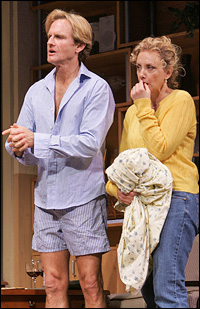*
Ask Playbill.com answers your (and sometimes our own) theatre-related questions. To ask a question, email [email protected]. Please specify how you would like your name displayed and please include the city in which you live.
 |
||
| Jere Burns and J. Smith-Cameron in After the Night and the Music, which opened four days before the 2005 Tony Awards. |
||
| photo by Joan Marcus |
Every spring, there's a big Broadway show pile-up in April, during the days leading up to the announcement of the Tony Awards nominations. Then, crickets. Not another show until well after the Tony Awards ceremony.
Common sense answers the question in part. What fool producer would want to open a Broadway production during May, when the entire New York theatre community is distracted by the awards season and the outcome of the Tonys? But is the a general rule put out by the Broadway League, the trade organization of producers, that makes such an opening verboten? Quick answer: No. "There is no League rule," said Shawn Purdy, spokesperson for the League. "The rules for Tony eligibility are set by the Tony Awards Administration Committee." In fact, a quick search reveals that May openings are not entirely unknown. In 2005, Elaine May's After the Night and the Music opened at the Biltmore Theatre on June 1, four days before the Tonys broadcast. And in 2003, a revival of Athol Fugard's Master Harold…and the boys opened a few days before the Tonys. Question: Why do Broadway musicals so frequently have a cast size of 26? —Brian in Illinois
Certainly, Broadway musicals don't always have a cast of 26 performers. But, when you're talking a certain kind of big, splashy, old-fashioned musical, the actor population does tend to hover in that general vicinity. How to Succeed… and Catch Me If You Can have 26 actors. Sister Act has 27, Wonderland 25, and Anything Goes 28. Is there a creative or economic reason why this is so? We asked a couple of the creatives on a current "26 Show," Catch Me If You Can.
"Every musical has a budget and that is often based on the size house for your size show," said choreographer Jerry Mitchell. "The bigger the cast, the more seats you need to sell to pay not only the cast's salaries, but the salaries of the entire company. So most musicals playing in many of the 1,300-1,500-seat houses can handle a cast between 22-30."
Composer Marc Shaiman said, "There is a lot of 'chicken or the egg' to the process of determining the size of the cast of a Broadway musical." Here's how he broke it down: "You've got your protagonist and their love interest. That's 2! And there is the antagonist. OK, that's 3. Then there is the comic couple/sub plot. That brings us up to 5. And there has to be at least 4 more people to fill out all their lives, no? Their best friends, mothers, psychiatrists, bosses, etc. So we now have 9 lead or featured roles.
"All right, now we want to have an even amount of men and women in the ensemble (which is the fancy new word for 'chorus') populating this story to play all sorts of other smaller roles and sing and dance all night long! To fill a Broadway stage nicely, sing all that good harmony and make nice patterns in shape to please the eye, let us say 8 girls and 8 guys are needed. Less than that will make for a rather empty stage if you are in a good-sized house. So, add those hard working 16 to our 9 principals and we have 25. Fine, let's add in one more person, a wild card (your Jackie Hoffman!), to bring us to the magic number of 26. Now, here is the thing 'chicken or the egg' part that I never really stopped to think about until I was involved with Hairspray, and it very much rules all the above, and that is...understudies! You must cast the ensemble with people who can play the lead roles. And then cast someone besides them to also be able to cover those roles during flu season! Sometimes, the team must create chorus roles (or 'tracks' as they are called on The Broadway) to insure that someone who can play, for instance, Motormouth Maybelle is in the ensemble."
Simple question. Complicated answer.











